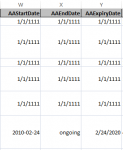Hi everyone
So awhile back I was splitting up date fields in Excel. In the beginning there was two date fields. The first was called"AAStartDate" and had either blanks or a date entered. The second"AAEndDate" had either a date or the word ongoing entered. I added a third table called "AAExpiryDate" because I was told that ongoing = Start Date + 10 years and thus the actual expiry date could be stored in this column. I also put 1/1/1111 in cells that were blank as seen below.
When imported this excel file into Access, I changed AAExpiryDate data type to Date/Time with the format Short Date (e.g. 11/12/2013) and put the input mask as 99/99/0000;0; but when I go back to datasheet view, I notice in AAExpiryDate cells with 1/1/1111 have appear blank but once you click in a cell this appears:
_/_/__
And also in both AAStartDate and AAEndDate cells that had 1/1/1111 in Excel appear as the value "36526". Why is this?
So awhile back I was splitting up date fields in Excel. In the beginning there was two date fields. The first was called"AAStartDate" and had either blanks or a date entered. The second"AAEndDate" had either a date or the word ongoing entered. I added a third table called "AAExpiryDate" because I was told that ongoing = Start Date + 10 years and thus the actual expiry date could be stored in this column. I also put 1/1/1111 in cells that were blank as seen below.
When imported this excel file into Access, I changed AAExpiryDate data type to Date/Time with the format Short Date (e.g. 11/12/2013) and put the input mask as 99/99/0000;0; but when I go back to datasheet view, I notice in AAExpiryDate cells with 1/1/1111 have appear blank but once you click in a cell this appears:
_/_/__
And also in both AAStartDate and AAEndDate cells that had 1/1/1111 in Excel appear as the value "36526". Why is this?


